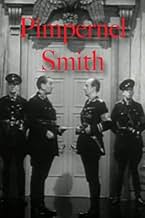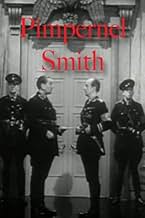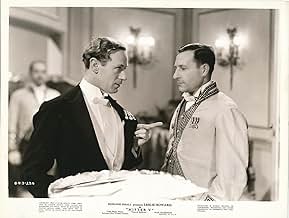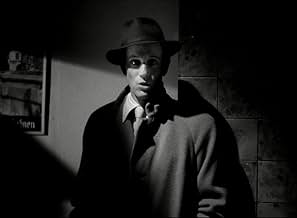Adicionar um enredo no seu idiomaProfessor Horatio Smith, while seeming very unassuming, rescues victims of Nazi persecution during World War II.Professor Horatio Smith, while seeming very unassuming, rescues victims of Nazi persecution during World War II.Professor Horatio Smith, while seeming very unassuming, rescues victims of Nazi persecution during World War II.
- Direção
- Roteiristas
- Artistas
- Prêmios
- 4 vitórias no total
- General von Graum
- (as Francis Sullivan)
- Clarence Elstead
- (as Lawrence Kitchen)
Avaliações em destaque
If you do look at other comments, a few points: This film is *funny* too! It was not Leslie Howard's last film - 49th Parallel was made later the same year, and First of the Few in 1942, then he subsequently directed 'The Gentle Sex' and 'The Lamp still Burns' in 1943.
Howard was certainly on the Nazi's blacklist, but his death may have been an accident. He was returning from a 'lecture tour' (which was certainly propaganda and may well have had intelligence connotations) via Portugal, and the civilian plane he was on was shot down over the bay of Biscay. It's still not clear if this was an accident or a deliberate target, but if the latter, it's as likely that Howard's accountant, who bore a strong resemblance to Churchill, may have been the target.
Also, look out Violette Cunningham, the assistant in the cosmetic shop. She was Howard's last love - despite still being married to Ruth, he fell for Violette (who also appears in the German dinner scene in 'The First of the Few'). It broke his heart when she died, of cerebral meningitis, in 1942.
In the film, Professor Smith takes six students with him on an archaeological dig in Germany, presumably to find out whether or not there was an early Aryan civilization in Germany. Smith tries to convince Gestapo leader General Von Graum (Francis L. Sullivan) that he is just a learned professor, reading from The Jabberwocky by Lewis Carroll and telling him his theory that William Shakespeare was really the Earl of Oxford. Imagine that! The Professor's wit and wisdom are no match for the humorless Nazis and they seem to fall for each of the professor's tricks. Unfortunately, the Nazis are depicted not as mass murderers but only as bumbling clowns who speak English as well as Winston Churchill.
When Smith is wounded, the students catch on to what he is up to and agree to help him in his attempts to secure the release of pianist Sidimir Koslowski (Peter Gawthorne). In his clandestine cat and mouse game, he meets Koslowski's daughter Ludmilla (Mary Morris) who is working for the Nazis in order to save her father and the two form a bond. Howard's role as Professor Smith is one of his most acclaimed in a career that included roles as Ashley Wilkes in Gone With the Wind and Sir Percy Blakeney in The Scarlet Pimpernel. He had a great sense of style and screen presence and his death in 1943 on what was most likely an intelligence gathering mission for the British left the film industry bereft of one of its brightest stars.
Albeit, very light fair, films like this were more to entertain and keep spirits high in not so certain times. The horrors of war can be looked back upon, but to push onward, the propaganda of the day was to show the enemy as almost comical foes, outwitted by the ever sensible Englishman. Leslie Howard plays this role beautifully and it remains one of my favorite performances by him...
But what we loved about him most was his unswerving patriotism. His love of this country, more evident during the war years, was something he lived by and eventually was something he gave his life for and we all herald him a hero in our midst. A truly great Englishman and one we can all be proud of. To us he was the sort of Englishman we all wanted to be and to Americans he was the Englishmen on whom all others would be judged from that day forward.
In Pimpernel Smith he all but reprises his roll as The Scarlett Pimpernel from the 1934 film of the same name. This time the action takes place in 1939 and our modern day Sir Percy is an architect on an expedition in Germany where our hero has the chance to rescue innocent political prisoners incarcerated by the Nazis.
There is very little gun play or physical violence at all, but we get plenty of entertainment by the casual and almost comedic performance by Howard as the foppish Smith, who whilst convincing the Germans he is a scatter brained professor, constantly out-smarts and out-wits them as he steals the 'enemies of the Reich' from under their very noses.
Ultra patriotic and echoing Howard's own anti-Nazi views, Pimpernel Smith is an espionage great with a powerful message to deliver.
I love the speech he makes at the end about how the Germans will never find a horizon and as how one day they will be lost and they will be doomed. Also the line, "I'll be back, we'll all be back" gives an almost spine chilling prediction of D-day. Three years before D-day and four years before the final victory, it is amazing just how accurate Howard's words were, words made more powerful with our knowledge that Howard himself would not live to see either event.
One of the best British propaganda films of the war years ,it has enough elements here to have your British hearts souring with pride re: the Rupert Brooke quote and enough to keep you on the edge of whatever you may be sitting on at the time.
Look out also for a young David 'Bedknobs and Broomsticks' Tomlinson as one of Smith's students.
Você sabia?
- CuriosidadesOne of the earliest movies to openly and unflinchingly discuss Nazi labor, concentration, and death camps.
- Erros de gravaçãoAt the reception in the English embassy, Professor Smith misquotes Lewis Carroll's Jabberwocky. He mispronounces "borogoves" in the third line of the poem as "borogroves".
- Citações
General von Graum: But we have one problem. "To be or not to be?" as our great German poet said.
Professor Horatio Smith: German? But that's Shakespeare.
Professor Horatio Smith: But you don't know?
Professor Horatio Smith: Why, I know it's Shakespeare. I thought Shakespeare was English.
General von Graum: No, no, no. Shakespeare is a German. Professor Schuessbacher has proved it once and for all.
Professor Horatio Smith: Oh dear, how very upsetting. Still, you must admit that the English translations are most remarkable.
General von Graum: Good night.
Professor Horatio Smith: Good night. Good night. "Parting is such sweet sorrow."
General von Graum: What is that?
Professor Horatio Smith: One of the most famous lines in German literature.
- Cenas durante ou pós-créditosImmediately following the opening credits: "The tale we are about to unfold to you is a fantasy. None of its characters are living persons. But it is based on the exploits of a number of courageous men who were and are still risking their lives daily to aid those unfortunate people of many nationalities who are being persecuted and exterminated by the Nazis. To these champions of freedom this story is dedicated."
- Versões alternativasThis film was cut and retitled 'Mister V' for its first American release in the early 1940s. Some versions censor the response from Hugh McDermott's character "I'd do my damndest..." in response to a question posed by Leslie Howard's character at a table in a café.
Principais escolhas
- How long is Mister V?Fornecido pela Alexa
Detalhes
- Data de lançamento
- País de origem
- Idiomas
- Também conhecido como
- Profesor Smit
- Locações de filme
- D&P Studios, Denham, Uxbridge, Buckinghamshire, Inglaterra, Reino Unido(as D & P Studios Denham . . . England)
- Empresa de produção
- Consulte mais créditos da empresa na IMDbPro
- Tempo de duração
- 2 h(120 min)
- Cor
- Proporção
- 1.37 : 1
























